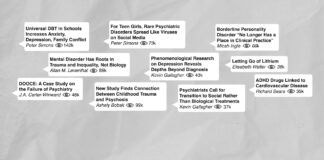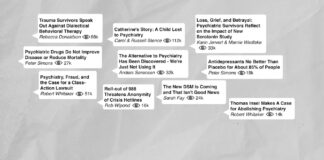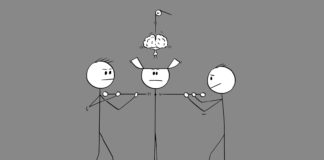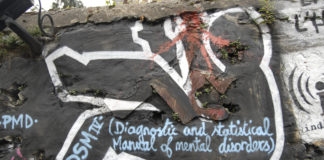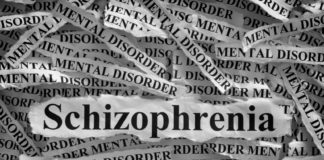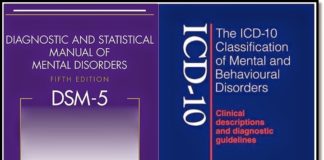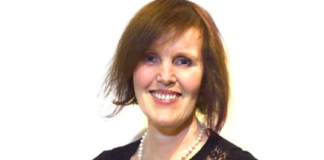Tag: DSM
Teralyn Sell and Jenn Schmitz: Breaking Out of the Prison of...
On the Mad in America podcast, Brooke Siem talks with Teralyn Sell and Jenn Schmitz about their journey from working in the prison system to challenging conventional psychiatric narratives in their therapy practice and podcast, The Gaslit Truth.
Undisclosed Financial Conflicts of Interest in the DSM-5: An Interview with...
On the Mad in America podcast we talk with Lisa Cosgrove and Brian Piper about their BMJ paper entitled "Undisclosed Financial Conflicts of Interest in the DSM-5 TR: Cross-Sectional Analysis"
Mad in America’s 10 Most Popular Articles in 2023
A roundup of Mad in America's most read blogs and personal stories of 2023 as chosen by our readers.
Cured: A Memoir—Sarah Fay on Giving Everyone the Chance to Heal
Author Sarah Fay joins us to discuss why "cured" is such a seldom-used word in psychiatry.
Leading Psychiatrists Unwittingly Acknowledge Psychiatry Is a Religion, Not a Science
Leading figures in psychiatry acknowledge that DSM psychiatric diagnoses and the chemical imbalance theory of mental illness are not scientifically valid, but are useful fictions that help people manage their emotions and comply with their medication treatments.
Mad in America’s 10 Most Popular Articles in 2022
A roundup of Mad in America's most read blogs and personal stories of 2022 as chosen by our readers.
The Failings of “Mental Health”: How a Seemingly Benign Concept Might...
MIA’s Ayurdhi Dhar interviews Bruce Cohen about dismissive psychiatrists, pervasive psychiatry, and the field's ties to neoliberal capitalism.
Robert Spitzer on DSM-III: A Recently Recovered Interview
Robert Spitzer, chair of the Task Force for DSM-III, discusses his decisions on inclusion, exclusion, expansion, and renaming disorders in the manual.
The New DSM Is Coming and That Isn’t Good News
Binge Eating Disorder is one of many invalid diagnoses we’ll continue to receive as a result of the APA’s failure to correct the mistakes of past versions of the DSM.
Kenneth Kendler: “Implausible” That Psychiatric Diagnoses Even “Approximately True”
In JAMA Psychiatry, prominent psychiatrist Kenneth Kendler writes that psychiatric diagnoses are “working hypotheses, subject to change.”
The DSM Files: Investigating the Incoherence of Psychiatry’s Bible
A critical view of the way the DSM categorizes internal suffering and makes sense (or sometimes nonsense) of it—full of inconsistencies and bad logic.
Books Under Review: Fall 2021
Reviews of four recent books reflecting various perspectives on the mental health system, including explorations of the DSM and Open Dialogue.
How Psychiatry Turned General Difficulties in Adaptation into “Real Illnesses Just...
Though many psychiatrists have abandoned the "chemical imbalance" concept, they now promote the use of a pre-scientific notion that the only criteria for defining disease is the presence of distress or impairment.
Giving Up on Mental Health Care
After 34 years, I've concluded that some psychologists/psychiatrists may genuinely want to help people, but they certainly don't have a good toolbox to do it with and, quite likely, never will.
Welcome to Planet Psychiatry
With the leadership of industry and their cosseted, lapdog doctors, psychiatric medications are prescribed indiscriminately to nearly anyone entering a physician’s office with a psychological complaint.
Decontextualized Depression and PTSD Diagnoses Fail Indigenous Communities
A case analysis of an American Indian woman illustrates how the DSM diagnostic criteria misrepresent the lives of indigenous people.
Belgian Guidelines Recommend “DSM Categories Not be at the Centre of...
The Superior Health Council of Belgium documents numerous problems with the evidence base in the manuals used to diagnose “mental illness” and cautions against their use.
Constructing Alternatives to the DSM: An Interview with Dr. Jonathan Raskin
Dr. Raskin discusses psychotherapists’ dissatisfaction with current psychiatric diagnostic systems and explores alternatives.
Researchers Make the Case to Rename Schizophrenia
The authors outline reasons for renaming schizophrenia and the way a change can reform practice.
Developing Alternatives to the DSM for Psychotherapists
A new article suggests counselors and psychotherapists are dissatisfied with current diagnostic systems and outlines some potential alternatives.
Minimal Evidence for Disruptive Mood Dysregulation Disorder in Childhood
Researchers offer a critical take on the inclusion of the Disruptive Mood Dysregulation Disorder in the DSM-V.
The Creation of an Illness: Video Games and Defining Addiction
Part of what we mean when we say something is socially constructed is that the existence of an entity, in this case a specific medical condition, partly or wholly depends on certain social attitudes, beliefs, or reactions towards that entity. In this particular case, a mental illness exists if and only if it causes certain types of distress that we get to define.
D Is For Diagnosis
In this episode of BBC Radio's Four Thought, child and adolescent psychiatrist Ann York discusses the benefits and potential pitfalls of psychiatric diagnoses and shares her...
Study Calls for Consensus on Overdiagnosis Across Medical Disciplines
Lack of overdiagnosis parameters stifles communication across fields seeking to mitigate its potential harm.
Susie Orbach’s Guide to Books to Understand Yourself
In this piece for The Guardian, Susie Orbach argues that we should not turn to the DSM to understand ourselves, but instead to the work of...



